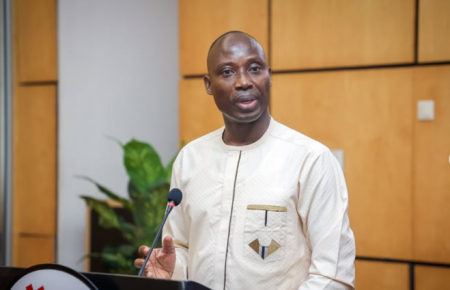The Minister of Interior, Muntaka Mubarak, delivered a stern warning to police officers engaged in the fraudulent practice of altering the identities of foreign nationals upon arrest, emphasizing that such misconduct would face severe repercussions. During an official visit to the Ashanti Regional Police Command headquarters, the Minister voiced his grave concerns regarding reports of officers manipulating arrest records by substituting the names of detained foreign individuals with Ghanaian identities. This deceptive practice, he asserted, not only violated ethical standards but also constituted a blatant disregard for the law. Minister Mubarak declared that any officer found complicit in this illegal activity would be subject to stringent disciplinary action, underscoring the detrimental impact such behavior has on the credibility and public trust in the Ghana Police Service. He framed the falsified records as a serious breach of protocol, jeopardizing national security and undermining the foundations of the rule of law.
Minister Mubarak’s address went beyond the issue of identity falsification, extending to the broader challenges of crime within the Ashanti Region. He specifically highlighted the persistent drug-related activities at “Tinker Island” in the Manhyia South Constituency, a location notorious for its role as a drug hub. Issuing a direct challenge to the Ashanti Regional Police Command, the Minister mandated a comprehensive operation within six months to dismantle this center of illicit activity. He stressed the urgency of disrupting drug networks, advocating for a decisive crackdown targeting both drug peddlers and users. This directive underscored the Minister’s unwavering commitment to supporting law enforcement in their fight against crime, coupled with a firm demand for accountability and integrity from every member of the police force.
The Minister’s pronouncements reflected a multi-pronged approach to addressing the challenges faced by law enforcement in the Ashanti Region. He emphasized the importance of upholding ethical standards and respecting legal procedures, particularly when dealing with foreign nationals. The falsification of identities, he argued, represented a betrayal of the public trust and a dangerous erosion of the principles upon which a just and effective police force is built. His emphasis on accountability served as a clear message to officers that such misconduct would not be tolerated and would be met with swift and decisive action.
Furthermore, the Minister’s focus on the drug trade at “Tinker Island” demonstrated a commitment to tackling the root causes of crime within the region. By demanding a comprehensive operation to dismantle this drug hub, he signaled a proactive stance against the spread of narcotics and the associated criminal activities that often accompany drug trafficking. The six-month deadline imposed on the Ashanti Regional Police Command underscored the seriousness of the situation and the Minister’s determination to see tangible results in the fight against drug-related crime.
The Minister’s visit to the Ashanti Regional Police Command headquarters served as a platform to articulate his vision for a more professional and accountable police force. His address conveyed a clear message: integrity and adherence to the rule of law are non-negotiable principles for all members of the Ghana Police Service. By addressing the issues of identity falsification and drug trafficking with such directness, Minister Mubarak aimed to instill a renewed sense of purpose and responsibility within the ranks of law enforcement, emphasizing the importance of their role in upholding public safety and maintaining the integrity of the justice system.
In closing, Minister Mubarak’s visit underscored the government’s commitment to tackling crime and promoting ethical policing in the Ashanti Region. His strong words served as both a warning and a call to action, demanding adherence to the highest standards of professional conduct and a renewed focus on combating the pervasive influence of drug trafficking. The message was clear: the government would support the police in their efforts to maintain law and order, but accountability and integrity would be paramount in this pursuit. The success of this initiative ultimately rests on the commitment of individual officers to uphold their oaths and serve the public with honesty and dedication.














